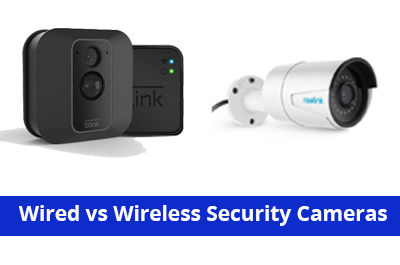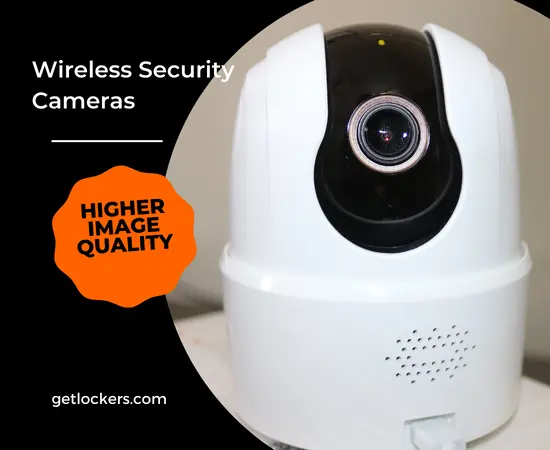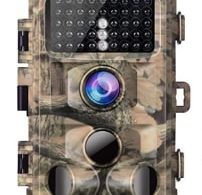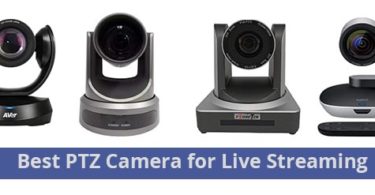As an Amazon Associate, I can earn from qualifying purchases. Learn more.
Without a doubt, CCTV technology has helped change the way of surveillance and secure one’s properties. The confusion between wired vs wireless security cameras, though, has made many to make wrong buying decisions. Henceforth, compromising the effectiveness and the success of the sought results.
Needless to say, both types of monitoring devices are worthwhile to own and use. But each has unique features that allow it to stand out from the other in particular applications and situations.
With that, we are going to compare wired and wireless security camera systems, including the pros and cons of each. Then, at least you can have a better intuition to guide you in making a favorable decision when buying.

What Makes A Security Camera Wired Or Wireless
Basically, how helpful a security camera mainly depends on what you need to achieve. The video surveillance field is pretty huge at the moment, meaning you now have a better chance to serve to get exactly what you need. If your interest is on streamlined installation and easier maintenance, wireless systems are the winners in the area.
But if you are more concerned about reliable and seamless monitoring, then, the wired cameras are a better choice. While the two works on the same goal of making it possible to monitor your property, their operating mechanics are quite different.
The following discussion can help you better understand these differences so that you can make an appropriate buying decision.
Introducing Wireless Security Cameras
A wireless security camera is currently the most sought after selection due to its effortless setup. The majority of the systems under the catalog take less than an hour to set up, including the mounting and configuration process.
Even so, many people tend to associate a wireless camera as being wire-free, which certainly is not the case. A camera is referred to as wireless due to its ability to transmit the captured videos wirelessly without cables. It does so through the help of individual sensors [or transmitter] that connect with the central control panel wirelessly using radiofrequency technology.
After that, the control panel communicates with the outside world [NVR or Router] via a network bridge, which can be Wi-Fi or P2P.
This is yet another mistake you will come across, whereby over 90% link a wireless CCTV as a WI-FI device; whereas that’s not always the case. Some cameras feature the Peer-to-peer [commonly called P2P] technology that allows them to display videos using a unique ID number instead of a static IP address.
Still, wireless security cameras can be divided into two other categories: plugged-in and battery-powered. In this case, the latter option is now what we call wire-free cameras as they have zero wire in their connection. The majority of the brands in the category usually function with batteries, but you can find some that use solar panels.
On their end, plugged-in wireless security cameras need to be plugged into an outlet for them to be active. As such, they will have a cable for the power but the communication with the NVR or router will be through Wi-Fi or P2P connection.
Why Should You Choose A Wireless Security Camera?
More or less, a wireless surveillance camera aims on addressing the major downside to the hardwired security cam: installation.
So, since the device doesn’t need connecting with the video cables, you can mount in areas impossible with wired types. This includes remote areas and positions without access to electricity while using a solar or battery-powered device.
Apart from that, the other pros and cons of a wireless home security system include:
Pros:
Effortless and quick installation: this is the strong point of a wireless security camera due to the exclusion of video cables. You only have to make sure it has access to power and the connection with the base station and NVR or router is stable.
Easier to operate: Just as the installation, operating a wireless cam is straightforward. With a Peer-to-Peer system, for instance, you only need to provide power. Then the camera and the control panel will auto-pair in a matter of seconds. Moreover, the functions are pretty easy and fast to switch through.
More Portable: this is also enhanced by their less/ no wires design, in which case you can easily use in your temporary home. As mentioned, they’re pretty easy to set up and it’s no hassle to take them down as well. So, it’s a great choice for rental apartments, dorms, and hotels.
Low Operating budget: Although their buying cost is a little high, wireless cameras are pretty cheap to install and maintain. You certainly won’t need tools like the crimping pliers or even hiring an installer. And the best of all, there will be no video cables that need replacing.
Cons
Interference: This is the most critical drawback of a wireless security camera due to the interference of the signal. It can happen due to the blocking by the environment features such as trees, tall buildings, and thick walls. Or else from the competition by other wireless devices such as microwaves, smartphones, and Bluetooth stereos.
Limited range: Every wireless camera has to be within a range with the base station or the wireless NVR for maximum productivity. Failure to do so will lead to broken signals, which then causes poor performance, including glitches, video lags, or zero recordings. Hence, rendering the system inconvenient for larger properties.
Intrusion of Privacy: particularly with the Wifi cameras, it’s not once or twice we have heard of the “leaked” surveillance footage. It occurs when companies have poor security protocols that leave their devices open to talented hackers, giving them unauthorized access.
Introducing Wired Security Cameras
While you can find them in homes, wired security cameras are quite common in large commercial buildings, institutions, and public areas. It’s certainly the oldest as technologies like the internet became accessible to the general population just recently in the early ’90.
Just as the name, a wired CCTV usually relies on cables to relay information to the central control panel. In this case, not just for the power, but for video transmission and internet connection as well.
Nonetheless, your wired security camera can either feather PoE [Power Over Ethernet] or Traditional analog technology.
Sad to say, an analog camera is currently less common as its setup is relatively harder and time-consuming. It usually relies on two cables to start recording- one for power and another for data transmission. The data cable, also known as coaxial cable, tend to have BNC connectors that you connect to the camera and the DVR.
For a Wired PoE surveillance camera, the setup is pretty easier to conduct than its counterpart. The system tends to use Cat 5 or Cat 6 Ethernet wires to communicate with the recorder [NVR], in which case they transmit data and power.
Therefore, a PoE CCTV is not a must you plug into power, but it can be necessary when running cables far. Furthermore, you can use it as a standalone by connecting to your router via a PoE injector/ switch.
Why Should You Choose A Wired Security Camera?
Technically, a wired security camera offers the best result where you need the most reliable connection. As long the cables are properly connected, you won’t have to worry about dropped signals or connectivity issues. You can even connect the cameras at a distant and still stream crystal-clear footage.
Anyways, let’s view the various positives and negatives associated with a wired CCTV system.
Pros:
Reliability: this is one of the primary determining factors when choosing between wired and wireless security camera system. With the former, you get to enjoy seamless streaming without needing to worry about signal interferences or charging the batteries. Forasmuch as the power is stable, you get to receive the constant and uncut recording.
Affordable: a wired security camera certainly costs less than a wireless system of similar specs.
Higher Image Quality: Without being biased, a genuine security expert will tell you wired PoE cameras produce the best images. This is so as an Ethernet cable carries a higher bandwidth and at a faster rate than a wireless connection. Hence, rendering the capturing of sharper images.

Connect with more cameras: This is yet another key feature of a wired CCTV and which helps boost its convenience in monitoring larger properties. The encompassed units support 4 to 16 cameras, which allows you to monitor your home or business from multiple angles. Thus, lessening the blind spot and enhancing security.
Solider Privacy: since wired CCTV isn’t connected to any wireless it’s harder for the hackers to gain access wirelessly. As such, the selection is much better in retaining one’s privacy. Moreover, the burglars can’t jam the transmission since no radio frequency can be blocked. Thereby, leaving them with the option to cut the cables to stop the camera from recording- which can also be tricky if the wires are hidden.
Cons:
Hassle of installation: this is the main issue with wired security cameras, especially the traditional analog models. It can be tiring and time-consuming to run those cables around your property, and even more boring to hide them.
Vulnerable to power Outrages: if your property location is susceptible to frequent power outages, a wired security camera won’t be the best idea for you. It means whenever the power goes out, your monitoring device goes dark too. Hence, defeating its purpose on reliable surveillance.
High operating cost: while they happen to be cheaper to buy than that of a comparable wireless system, wired security cameras cost more to setup. This occurs due to their intricate wiring manner, which might need professional assistance for processes like crimping. The same goes for maintenance in case the cables are damaged.
Wired Vs Wireless Security Cameras: Which Should You Choose?
Up to now, we are sure you have the basic knowledge to distinguishing surveillance system with wired and wireless security cameras. Each of the two has various amazing features, and thanks to the innovation spirit, their capabilities keep on getting better.
So, we will now briefly compare the two types of security systems respective to the 3 key surveillance factors, starting with image quality.
Image Quality
The last thing you would want is installing a CCTV that gives you a blue screen and blurry images most of the time. As you pick your system, therefore, you have to not only consider the resolution but also the means of transmission.
With a wireless 8MP security camera, for instance, it’s pretty easy to get 720p images while you should be receiving Vivid 4K UltraHD. Aspects like unstable/ degraded wifi network, structural and electromagnetic interferences, plus long distances could lead to poor transmission.
With a wired device, though, you can be able to overcome such and enjoy stable transmission. With a PoE camera, you’ll even get bright and crisp images that you can comfortably zoom without drastically reducing the quality.
Storage
The main purpose of a video surveillance system is to help in monitoring and enhancing security. One of the ways it efficiently fulfills this is by storing the recordings, which you can then use in case of an event.
Security cameras often save data locally in a hard drive/ micro SD card, or on a cloud server. The former is widely in use with wired cams, especially the traditional analog designs that have a DVR containing a hard drive. Hence, primarily records locally, which means you won’t need cloud storage even though some brands support the feature.
On the other hand, most of the wireless cameras store their footage on the cloud, which requires you to create a personal account. With that account, it’s pretty awesome as you can access and playback footages anytime, anywhere. On the dark side, however, most providers require you to pay a certain subscription fee so that your account can remain active. Hence, bringing operating cost, which you might be uncomfortable with.
Nonetheless, some Wi-Fi cams do have a built-in Micro SD card function that allows them to record online, plus locally. Thereby, ensuring you have recorded evidence whether the internet is there or not.
Smart Features
For this one, we simply refer to the specialty functions that help enhance the effectiveness of a security camera. The majority of the features aren’t a “must-have”, but they can help you make the most out of your system through machine learning technology.
Here is a table summarizing the most common smart features that you can find in a security system:
| Facts | Wired Camera | Wireless Camera |
| Motion Detection | Yes | Yes |
| Facial Recognition | Fairly [PoE IP cameras] |
Yes |
| Person Detection | Yes | Yes |
| Two-Way Audio | Fairly | Yes |
| Sound Recognition | Fairly | Fairly |
| Video tampering | Yes [PoE IP cameras] |
No |
| Smart home integration | Fairly | Yes [Alexa or Google Assistant] |
Final Recap:
Both wired and wireless security cameras are great systems to invest in. By the rule of work, none is more superior than the other. Each system is just unique in its way and suitable for specific situations.
If it’s a wireless model, the device is best for renters who seek a temporary fix to heighten the security of their properties. The CCTV design is so easy to set up and takedown, as well as a move to different locations.
Well, for the wired cameras, their form is for serving the needs of those who need constant 24/7 monitoring. The systems can be tricky to get them working collectively, but once that’s complete, you certainly won’t have signal interference.
That’s all for now. Hopefully, our article has provided the solution you were seeking and you’re ready to introduce a third eye on your property.



